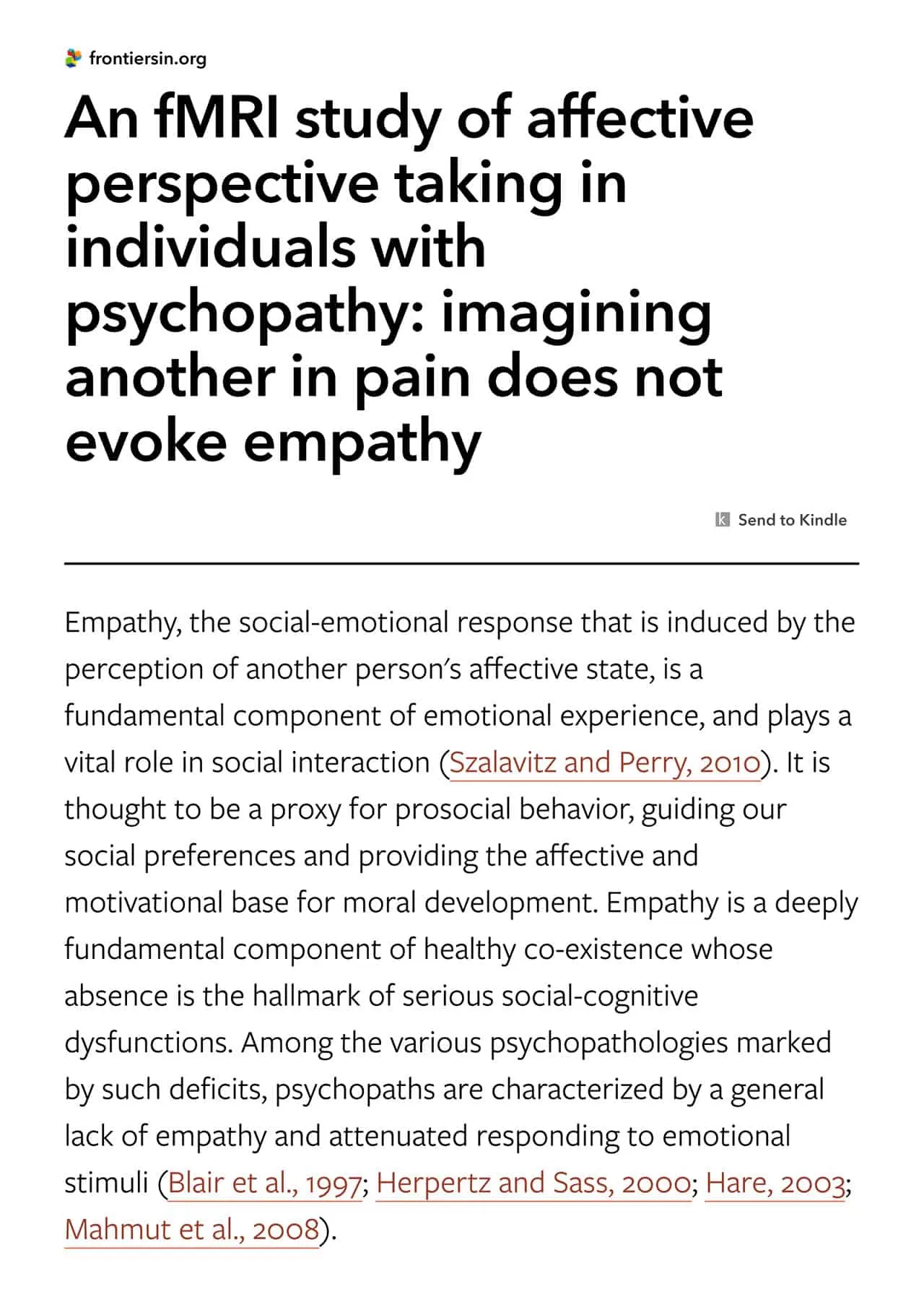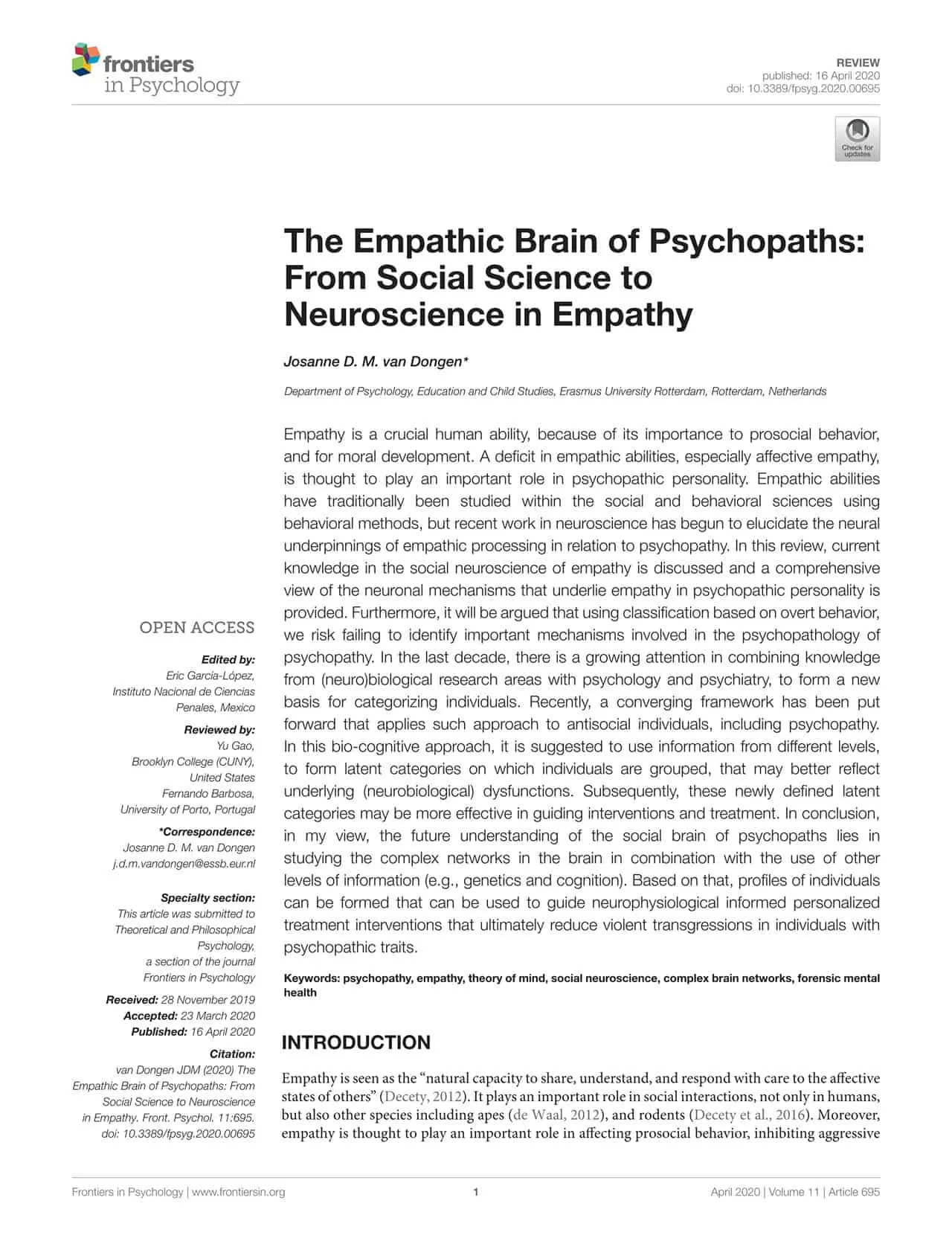Today's Monday • 10 mins read
— Reviewed by Dr. Sandip Roy.
Psychopaths have long been defined as impulsive, antisocial, and criminal-minded people who lack all concern for others. So, can a psychopath feel empathy?
As humans, we have brain regions that can map other people’s emotions (like fear, disgust, pain) to our own. This lets us understand as well as feel as and feel with the other person. That is empathy.
Psychopaths are known as cold-blooded and cold-hearted people who are simply not bothered by the suffering of others. When someone is in pain, “psychos” just don’t seem to understand what to do with their emotions.
Now, surprise! Recent research suggests psychopaths might be capable of feeling empathy — under certain conditions.
[Read this to decode psychopaths better: The Wisdom of Psychopaths Summary]
Can Psychopaths Feel Empathy?
Experts hold that while psychopaths can mimic empathy to manipulate others, they do not actually feel it.
- Blair & Peschardt (2006) suggested that a lack of empathy is a core deficit in psychopathy.
- Baron-Cohen & Wheelwright (2001) found that children with psychopathic tendencies have trouble recognizing facial, eye, and voice expressions of emotions.
- Soderstrom (2003) suggested psychopathy can be seen as an empathy disorder with specific problems in understanding the thoughts, emotions, and communication of others.
The psychopaths can’t help it because their lack of empathy is related to their malfunctioning “social brain” circuitry.
In a study with 94 male prisoners, researchers used a brain imaging technique (fMRI) to measure brain activity during a specific task.
- The participants were shown pictures of two people interacting, but the facial expression of one person was hidden.
- The participants had to guess the emotion of the hidden person by choosing from two options, such as anger, fear, happiness, sadness, or neutral.
- Those who scored high for psychopathy had a harder time with this task. Their brain scans showed less activity in areas related to empathy.
- This suggested they have difficulty understanding and sharing other people’s emotions.
“Psychopaths are not disordered because they lack empathy, but because they lack a conscience. They are not motivated by the desire to do good or avoid evil, but by the desire to achieve their goals and satisfy their own needs.” — Dr. Robert Hare, a leading expert on psychopathy
Can Psychopaths Ever Feel Empathy?
Though psychopathy is marked by emotional coldness and a lack of empathy, psychopaths can feel empathy at certain times.
Psychopaths frequently fail to recognize emotions, especially happiness, sadness, surprise, and fear, when confronted with facial or vocal signs of another person’s emotions. They also show lesser physiological arousal in reaction to another’s distress.
However, the surprising fact is that psychopaths may be capable of feeling empathy when it serves their self-interest.
This study looked at the connection between empathy, sensitivity to justice, and psychopathy in 265 participants.
- They were asked to judge everyday moral situations involving choosing between personal gain and moral principles of justice.
- Surprisingly, the emotional side of empathy wasn’t related to caring about justice for others.
- Instead, the cognitive side of empathy (understanding others’ feelings) and empathic concern (caring for others’ well-being) were linked to sensitivity to justice and supporting moral rules.
- People with high levels of psychopathy, especially coldheartedness, were less motivated to uphold justice.
- The study also found that higher levels of psychopathy led to less disapproval of immoral behavior.
“10 percent of any population is cruel, no matter what, and 10 percent is merciful, no matter what, and the remaining 80 percent can be moved in either direction.”
― Susan Sontag
Do The Psychopaths Among Us Feel Our Pain?
They are often associated with criminal behavior, but not all psychopaths are criminals.
In fact, approximately 1% of the general population is found to have a psychopathic personality (Hare, 1999). So, psychopaths can be found in all walks of life, including business, politics, and entertainment.
The psychopaths among us often stand out as cold, callous, people indifferent to the suffering of others.
Studies have shown that while psychopaths cannot feel the pain of others (“other-empathy”), they are capable of feeling “self-empathy” under certain conditions.
This study found people with psychopathy can feel a strong response when imagining themselves in pain, but they struggle to do the same when thinking about others in pain.

Research on Empathy in Psychopaths
Research has shown that psychopaths have reduced activity in brain regions associated with empathy, such as the anterior cingulate cortex and the insula.
Studies have also shown that psychopaths are able to turn their empathy on and off at will. This ability to switch empathy on and off may explain why psychopaths can be charming and manipulative one moment and callous and cruel the next.
Overall, while psychopaths may have extreme difficulty feeling empathy, they are not completely devoid of this emotion.
“Psychopaths can experience empathy, but it takes effort and imagination.” – Dr. Kent Kiehl
“Psychopaths are not simply devoid of empathy. Rather, they have the ability to switch empathy on and off at will.” – Dr. James Blair
Can Psychopaths Have Cognitive Empathy?
Psychopaths are often characterized as lacking empathy, but they may have cognitive empathy. Recent research suggests that they can understand and recognize other people’s emotions and mental states, but they do not feel the same emotions themselves.
Cognitive empathy is the ability to understand and recognize other people’s emotions and mental states. It involves the ability to understand another’s perspective.
Cognitive empathy is different from emotional empathy, which involves feeling the same emotions as another person.
Psychopaths also do not have the inclination to act out in compassion or altruism towards the other person (compassionate empathy).
What Do Psychopaths Think of Empathy?
Psychopaths are classically characterized by a lack of empathy, remorse, and guilt. They have a reputation for being cold, callous, and manipulative.
Psychopaths’ Perception of Empathy
Psychopaths may be aware of the concept of empathy, but they do not experience it in the same way as non-psychopaths.
In fact, experts suggest psychopaths may have a distorted perception of empathy. They may recognize that others have emotions, but they do not feel those emotions themselves, at least as much as others can feel those.
This lack of emotional resonance can make it difficult for psychopaths to understand the impact of their actions on others.
Role of Empathy in Psychopathic Behavior
Empathy plays a crucial role in regulating social behavior.
“Empathy is a cornerstone of civilization, and without it, we would be lost. Psychopaths are a reminder of what we could become if we lose our capacity for empathy.” – Dr. Kent Kiehl, a neuroscientist
Without empathy, people may engage in behaviors that are harmful to others without feeling any guilt or remorse.
Psychopaths, in particular, are known for their impulsive and aggressive behavior.
Research suggests that psychopaths may be able to use cognitive empathy to manipulate others. And then they may be able to mimic emotional responses to gain the trust of others.
This ability to “fake” empathy can make psychopaths appear more charming and persuasive than they really are.
“Psychopaths are fascinating because they are the ultimate predators. They are able to exploit others without feeling any guilt or remorse. But they are also tragic figures, because they are cut off from the very thing that makes us human: our ability to connect with others on an emotional level.” – Dr. James Blair, a psychologist who studies psychopathy
How To Teach Empathy to Psychopaths?
Can psychopaths learn to feel empathy?
While it may be challenging, research suggests that it is possible to teach empathy to individuals with psychopathic traits.
One of the main challenges is that psychopaths lack emotional empathy, which is the ability to share and feel the emotions of others. They also have difficulty recognizing emotions in others and may not understand the impact of their actions on others.
Another challenge is that psychopaths may not be motivated to learn empathy. They may see empathy as a weakness and may not see the value in developing this skill.
Effective Strategies for Teaching Empathy
Despite the challenges, there are effective strategies for teaching empathy to psychopaths. Here are some strategies that have been shown to be effective:
- Social skills training: Teaching psychopaths social skills such as active listening, perspective-taking, and nonverbal communication can help them develop empathy.
- Cognitive-behavioral therapy: CBT can help psychopaths identify and change their negative thought patterns and behaviors, which can lead to increased empathy.
- Role-playing exercises: Role-playing exercises can help psychopaths practice empathy in a safe and controlled environment.
“Empathy is a skill that can be taught and learned, even by those who lack it naturally.” — Simon Baron-Cohen
Ethical Considerations
Teaching empathy to psychopaths raises ethical considerations. Some argue that it is not ethical to teach empathy to individuals who may use this skill to manipulate and harm others. Others argue that it is important to teach empathy to psychopaths to reduce the harm they may cause to others.
Ultimately, teaching empathy to psychopaths requires a careful balance of ethical considerations and effective strategies. While it may not be easy, it is possible to teach empathy to individuals with psychopathic traits.
“Teaching empathy to psychopaths is not about turning them into saints but about reducing the harm they can cause to others.” — James Fallon

Do Psychopaths Feel Sympathy?
Psychopathy is a personality disorder characterized by a lack of empathy, remorse, and guilt. Psychopaths are often described as cold, calculating, and manipulative, with little regard for the feelings or well-being of others. Given their lack of empathy, it might be assumed that psychopaths are incapable of feeling sympathy for others.
Sympathy is the ability to feel compassion or sorrow for someone else’s misfortune. It is an emotional response to another person’s suffering and involves finding out about their well-being.
Sympathy is often accompanied by a desire to alleviate the other person’s pain or discomfort.
Do Psychopaths Not Feel Emotions or Do They Suppress Them?
One of the defining characteristics of psychopathy is the lack of empathy, which has led many to believe that psychopaths do not feel emotions at all. While it is true that psychopaths often lack empathy, this does not necessarily mean that they are incapable of feeling emotions. It is more likely that they have learned to suppress their emotions in certain situations.
Researchers suggest that psychopaths experience emotions, albeit differently than non-psychopaths.
Psychopaths are less likely to experience fear in response to a threat (“fear blindness”) than non-psychopaths. They are also less likely to experience sadness in response to negative stimuli.
“The notion that psychopaths lack emotions is a common misconception. Rather, it appears that they experience emotions differently than non-psychopaths.” – Dr. John Edens, Professor of Psychology, Texas A&M University
Final Words
Here are some key take-home messages:
- Psychopaths have a reduced ability to feel empathy, but they are not completely devoid of this emotion.
- Psychopaths may be able to feel empathy when they consciously control it, such as when they want to manipulate or charm someone.
- Psychopaths may also be able to feel empathy in response to certain stimuli, such as the suffering of animals or children, or when they perceive themselves as victims.
- However, psychopaths are less likely to feel empathy in response to the suffering of others in general, especially if it does not affect them directly.
√ Also Read: 4 Types of Psychopaths: One of Them Is Highly Dangerous
√ Please spread the word if you found this helpful.
• Our Story!